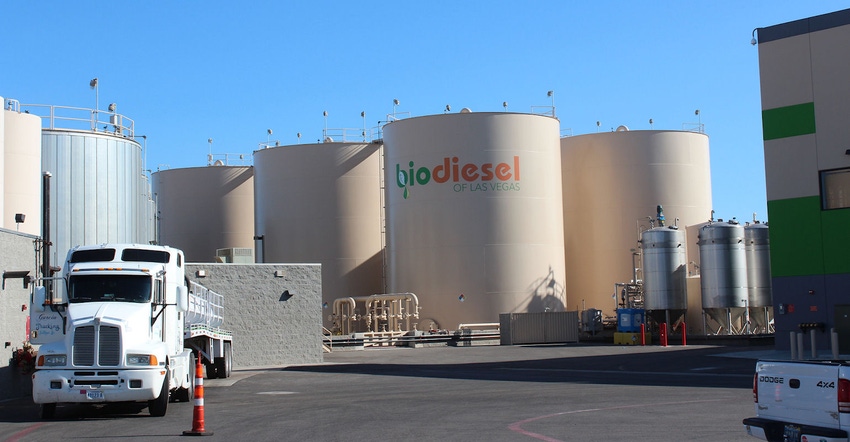
In 2020, domestic production of biodiesel alone exceeded 1.8 billion gallons, a hundredfold increase since the biodiesel tax credit was enacted in 2005. Thanks in part to the $1 per gallon tax credit, a new analysis calculates that the economics benefits of the market for biodiesel fuel fostered by the biodiesel tax credit supports 64,000 jobs and has a total impact on the economy of approximately $15 billion per annum.
Capital Policy Analytics released the new report, "The Economic Benefits of the Biodiesel Blenders' Credit," on behalf of the National Biodiesel Board. The report calculates annual economic benefits of $15 billion and environmental benefits of $4.3 billion from U.S. biodiesel production. The environmental benefits alone from each gallon of biodiesel that replaces petrodiesel exceed $2/gallon, or more than double the cost of the credit, the report continues. Biodiesel production supports approximately 13% of the value of each U.S. bushel of soybeans.
"The current tax credit expires at the end of 2022. Letting it expire would harm the U.S. economy and the environment, the data show," the report states.
"A significant body of research also demonstrates that the biodiesel tax credit easily passes a cost-benefit analysis, and that the environmental benefits alone from each gallon of biodiesel that replaces petrodiesel exceed two dollars a gallon, or more than double the cost of the credit,"
The U.S. biodiesel and renewable diesel industry supports 65,000 U.S. jobs and more than $17 billion in economic activity each year. Every 100 million gallons of production supports 3,200 jobs and $780 million in economic opportunity.
The new report estimates that expiration of the tax incentive would eliminate as many as 3,000 jobs in the biodiesel and renewable diesel industry. The total employment loss throughout the supply chain associated with production would be between 7,500 and 9,000 jobs. There would be associated losses in indirect economic impacts through the upstream supply chain that is associated with biodiesel manufacturing, as well as downstream induced economic impacts through diminished consumer spending.
Moreover, the report finds that in 2019 use of biodiesel reduced U.S. greenhouse gas emissions by nearly 18 million metric tons. The cumulative greenhouse gas emission reduction since the inception of the biodiesel tax incentive is more than 100 million metric tons.
The report authors write, "We believe that ending the credit in 2022, when the current legislation providing for it expires, would be inadvisable and would likely devastate the market, resulting in the destruction of thousands of jobs, an increase in greenhouse gas emissions and other local air pollutants, and the undoing of much of what the previous 17 years accomplished -- namely, the establishment of a robust market for an important fuel and an essential tool for reversing climate change."
Kurt Kovarik, NBB's Vice President of Federal Affairs, states, "This report demonstrates how remarkably effective the tax incentive has been in supporting the emergence of biodiesel and renewable diesel. As more and more American consumers demand better, cleaner fuels, a long-term and forward-looking tax incentive can help the industry sustainably grow and diversify. We appreciate the bipartisan support in Congress for continuing this policy."
However, the biodiesel tax credit has faced a modicum of opposition in Congress, as some have objected to what was to be a temporary tax incentive which is now approaching the end of its second decade in existence. A few others fear that the increased demand for soy and other sources for biofuels will increase U.S. food prices as well as the cultivation of previously fallow land, and in turn do harm to the environment, which the report says is false.
In the years when the credit is fully active, production increased by 40.2% (2013), 23.7% (2016) and 5.3% (2020). However, each pause in production growth occurred in a year when the tax credit had expired, and output declines tend to become acute in the second year of an expiration.
“The data and our analysis show that the $1 a gallon credit has been and remains a cost-effective way to boost production of biodiesel fuel. In the absence of a regime that imposes a commensurate tax on the emissions of carbon dioxide, particulate matter, or other pollutants, subsidizing its production is an effective way to achieve such reductions, and has generated environmental improvements valued in excess of $4 billion in 2020 alone,” the report concludes.
Jacqui Fatka, long-time policy editor at Farm Futures, will bring her valuable agricultural policy insight to the stage of the Business Summit in Iowa City, IA Jan. 20-21, 2021. Featuring industry experts and in-depth training sessions, it’s an opportunity to gain clear insights for a profitable future. Use code BOGO22 to receive discounted rate for a guest. Learn more and register now!
About the Author(s)
You May Also Like






